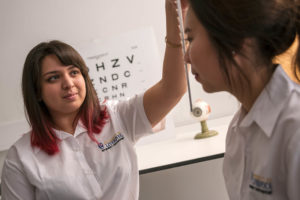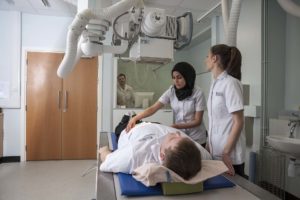How you'll learn
The programme is delivered online (synchronous and asynchronous) and also includes work-based learning for which you will need to identify a mentor in their workplace. Work-based learning and clinical E-portfolio development of competencies is key for the your success and supports authentic and active learning.
You will be directed to videos and guidance to support the acquisition and refinement of a range of clinical competencies as identified within the syllabus.
There will be scheduled online and asynchronous e-lectures delivered by a range of clinical experts and researchers across the themes identified in the syllabus. Interactive synchronous Q&A sessions will facilitate opportunities for students to interact with each other, ask questions, share experiences, and discuss concepts, thereby facilitating active learning.
There will be opportunities for online discussions related to anonymised patient presentations which will facilitate the integration of theoretical content with some of the more practical and patient-focused aspects of this module.
These clinical vignettes will also enable authenticity in learning and will encourage collaborative learning and develop digital fluency and allow clinical and academic experts to discuss anonymised clinical presentations synchronously with students online.
These facilitate understanding; clinical reasoning and synthesis but also enable you to reflect on your own experience, through active learning, and create communities of learning and practice to support one another during this online module and promote motivation and engagement.
How you're assessed
HEAL492 (20 credits) will be assessed through three components:
1. An online examination consisting of quiz like questions in the format of vignettes (scenarios) and some short answer questions which will address the theoretical aspect of the module. The questions will also include images and diagrams representing the module content. This is weighted at 80% of the module.
2. Practical clinical assessment of required clinical competencies (including nursing procedures) through the use of an e-portfolio. This is a pass/fail assessment based on the attainment of specified clinical competencies.
3. A 1000-word critical reflective summary commentary of your learning. This is weighted at 20% of the module.
HEAL493 (40 credits) will be assessed through the following four components:
1. Online examination: Consisting of a range of question formats including, short answer questions, clinical case scenarios, labelling and Multiple-Choice Questions. The variety in questioning approach will ensure all relevant aspects of module content can be covered and a range of interpretation, analysis and diagnostic knowledge and skills can be assessed in a clinically authentic manner. The format of case scenarios with short answer questions will address the theoretical aspect of the module. The questions will also include images, representing the module content. A formative opportunity will be provided during the module. This is weighted at 40% of the module.
2. Case Studies submission (4000 words in total): You will be required to submit 2x 2000 word case studies of a patient selected from the your professional practice area. Case studies will include details around presentation, history and differential diagnosis; demonstrating clinical reasoning and how you helped attain a diagnosis or management. You will be required to explore the psychosocial impact of ophthalmic disease on the patient and examine the role of the multidisciplinary team in the patients care. You must demonstrate critical reflection on your own role and limitations to ensure demonstrate self-awareness and personal development.
You must ensure anonymity of all information pertaining to the case study. You will be given the opportunity for formative feedback and peer discussion via an online support webinar during the module. Each case study will be submitted separately to allow feedback from the first to be used to inform submission for the second. This is weighted at 60% (30% each).
3. Practical clinical competency assessment. This is a continuous assessment where you will be required to upload documented evidence of achievement of competency in each of the clinical skills required for the role. Workplace mentors will be required to provide guidance and feedback on performance of these skills throughout the module and you can reattempt the skill until you achieve competence. This is a pass/fail assessment based on the attainment of specified competencies by the end of the module. (Pass/fail).
Liverpool Hallmarks
We have a distinctive approach to education, the Liverpool Curriculum Framework, which focuses on research-connected teaching, active learning, and authentic assessment to ensure our students graduate as digitally fluent and confident global citizens.
The Liverpool Curriculum framework sets out our distinctive approach to education. Our teaching staff support our students to develop academic knowledge, skills, and understanding alongside our graduate attributes:
- Digital fluency
- Confidence
- Global citizenship
Our curriculum is characterised by the three Liverpool Hallmarks:
- Research-connected teaching
- Active learning
- Authentic assessment
All this is underpinned by our core value of inclusivity and commitment to providing a curriculum that is accessible to all students.








